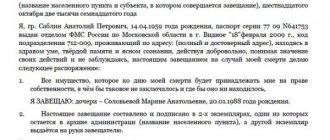What is a will
A will means a written order of a citizen in the event of his death. The document allows you to determine the circle of heirs and the size of their shares in the property being transferred.
The will comes into force after the death of the testator. The owner has the right to repeatedly change or cancel the document during its life.
Important! A special feature of the expression of will is the possibility of depriving relatives of their rights to property. The testator is not obliged to inform anyone of his decision.
The order is drawn up in 2 copies . One sample remains with the notary, the second is given to the testator.
Types of wills
The legislator distinguishes 4 types of administrative documents:
- Ordinary will . It can be issued by the testator or a notary. If a draft will is prepared by a notary, the testator will subsequently have to familiarize himself with the contents of the document. When drawing up an order, the testator is explained his rights/responsibilities and the legal consequences of certifying the will. If everything is clear to the testator, he signs the order in the presence of a notary. One copy of the document is given to the testator, the second is stored in the notarial archive.
- Closed order . It is not necessary to disclose it. A citizen can draw up an order and submit it to a notary in a sealed envelope. The testator must draw up such a document with his own hand and sign it. If the requirement is not met, then the expression of will may be declared invalid. 2 witnesses must be present when transferring a will . The specified persons are required to put signatures on the transmitted envelope. After which the notary places the document in a new envelope and makes an appropriate inscription on it. After completing the procedure, the notary gives the testator a document confirming the acceptance of the order.
- Testamentary disposition . The document has the force of a will, but is valid for bank deposits. The testator cannot assign other property in this way. Such an order is certified by an authorized employee of the bank in which the testator’s money is deposited. Inheritance of the deposit occurs in the general manner. The investor can set a condition for the heir to receive the money. For example, you can withdraw a deposit only when the heir reaches 18 years of age.
- Expression of will in emergency circumstances. Emergency circumstances mean a threat to the life of the testator (catastrophe, natural disaster, criminal attack). If the testator really cannot contact a notary and is in danger, then the will can be drawn up in writing. Such a document is handwritten by the testator and signed in the presence of 2 witnesses . The testator's last will must be clear from the text. Within 1 month after the end of the special situation, the testator must contact a notary and have the document notarized. To enter into an inheritance, recipients must have the document certified in court.
- Joint will of spouses . A husband and wife who are officially married can draw up a joint document. It must be in written notarial form. It cannot be certified by persons replacing the notary, or by witnesses in an emergency. In the event of the death of one of the spouses, the second has the right to cancel the document or change it at its own discretion.
Who can be a testator of housing and land?
A house or land plot is included in the anotar of the inheritance if it was owned by the person at the time of execution of the will. General provisions concerning citizens acting in the category of testator are reflected in Art. 1118 of the Civil Code of the Russian Federation. According to the law, a will is made by a fully capable person. Registration through a legal representative is not allowed, only in person.
The document can be drawn up not only individually, but also jointly with the spouse. It becomes invalid in the event of divorce or death of one of the testators.
Who can be named as an heir?
The law gives almost complete freedom of action to the testator. He can assign his property to relatives, third parties, an enterprise or the state (Article 1119 of the Civil Code of the Russian Federation).
The will can specify 1 or more claimants to the testator's assets. Additionally, it is possible to display the size of the share of each of them.
The testator may not indicate heirs, but transfer his property to the inheritance fund for subsequent disposal at his request. The foundation is registered by a notary after the opening of the inheritance. The share of property determined by the testator is transferred to the foundation.
Thus, a citizen can provide for the disposal of his property:
- monthly payments to relatives;
- investments in shares and other securities;
- charitable payments;
- other actions at the discretion of the owner.
The only limitation is that the testator cannot deprive socially vulnerable citizens of a share of the inheritance.
The rule on compulsory share of inheritance applies to the following citizens:
- minor children;
- disabled children, parents, spouse;
- disabled dependents of a deceased citizen.
If at the time of the owner’s death such a person is identified, he is entitled to at least half of the share that relatives inherit within the framework of the law (Article 1149 of the Civil Code of the Russian Federation).
Important! Deprivation of these citizens of a share of property may become grounds for declaring the order invalid.
The obligatory heir must choose between payments from the inheritance fund and the obligatory share. However, the share cannot exceed the amount for the maintenance of a citizen in order to maintain the standard of living that was available to him during the life of the testator.
Statute of limitations
In this case, we can talk about the validity period of the will itself and citizens’ requests for its acceptance or refusal. There is no limitation period. However, in the absence of a testamentary disposition during the opening phase of the inheritance, distribution in the general legal field (order of priority) will start. After which, each new owner will be issued a certificate of ownership.
A will discovered after all these procedures is more difficult to implement both in terms of time and financial costs, especially after a long period. In addition, the long existence of a will does not mean that there are no deadlines for the procedure for its acceptance, refusal and challenge in court (including recognition of its invalidity).
The listed heirs are given a six-month period to consent to or renounce the property of the deceased. The delay is subject to restoration by court decision also within six months after the elimination of the problem that previously prevented participation in the inheritance. Restoration of the period can be achieved by agreeing on this circumstance with all other applicants.
What documents are needed
To draw up a will, you must prepare the following papers and information:
- Civil passport of the testator.
- List of heirs and copies of their documents . Additionally, it is necessary to indicate the residential addresses and dates of birth of legal successors. If a citizen wanted to nominate an heir in the event of the death of the applicant, then his data will also be required.
- List of property to be released . Not only a list of assets, but also the shares of each heir can be indicated here. If the testator does not indicate specific shares, then the inheritance is distributed in equal parts among the claimants.
- Certificate of absence of mental illness . If a citizen has reached the age of 70 , then it is advisable to prepare a certificate from a medical institution confirming the absence of mental illness. It can be taken from a psychiatrist at your place of residence. The certificate will be additional confirmation that the person is aware and aware of the consequences of his actions. The absence of such a document may lead to a will being contested. Today, there are often cases where an administrative document is declared invalid due to the fact that the person did not realize the significance of his actions or could not control them.
- Additional papers . The list is not final. For example, if a foreign citizen contacts a notary office, you will need a foreign passport and its translation into Russian.
- Civil passports of witnesses . If witnesses will be involved in the registration of the inheritance, their passports will also be required.
Expert opinion
The features of writing and making wills are largely determined by the inheritance, the situation and the number of heirs. If a testator is planning a complex will with a clear distribution of shares of diverse and unequal property, he will need legal assistance. The notary may not take into account all the subtleties and nuances. In this regard, the true last will of the testator may be distorted.
Due to frequent updates to legislation and the legal uniqueness of each situation, we recommend obtaining a free telephone consultation with a lawyer. You can ask your question by calling the hotline number 8 (800) 555-40-36 or write it in the form below.
What is needed to compile
The drafting of a will usually takes place in a notary's office. The place of residence of the testator does not matter. A person can contact any notary in the country.
Actions of a notary when drawing up a will:
- Establishes the identity of a citizen,
- Checks his capacity.
- Explains the rights and responsibilities of a testator.
- Explains the rules of law on the secrecy of a will (in the presence of witnesses, an executor, an executor, and a translator).
- Provides assistance in drafting a written document (at the request of the applicant).
- Speaks out the text of the document (if a notary was involved in the execution of the will). The will shows the reason why the testator was unable to read it himself.
- Checks the text for compliance with legal norms (if the testator was involved in drawing up the expression of will).
- After reading the document, the testator puts his signature on it.
- If a person cannot sign a will on his own due to illness or illiteracy, then it is signed by another person in the presence of a notary. At the same time, the administrative document displays the reason why another person is signing and indicating his details (full name, registration address).
The notary has no right:
- Require the provision of evidence confirming the rights to the property being transferred.
- Require the consent of the potential successor.
- Deny the testator the presence of witnesses, with the exception of heirs. Witness details are also shown in the will. Additionally, the signature of the witness must be placed on the administrative document. The notary explains to the parties to the transaction their obligation to maintain the secrecy of the will.
- Prevent the presence of an interpreter. If a person who does not speak Russian contacts a notary office, the notary must draw up a will and translate the text into his native language. In some cases, an experienced translator is involved. The presence of specialized education or qualifications of the translator is confirmed by relevant documents.
Important! To avoid challenging the will, it is advisable to provide the notary with the documents of title for the inheritance. They will also help the testator to correctly display the information in the will.
Wills equivalent to notarial wills
Sometimes a person is physically unable to contact a notary. Then the will can be certified by other authorized persons:
- If a person is undergoing treatment in a medical institution or is in a nursing home, then the administrative document can be signed by the head physician of the hospital. Their deputies, doctors on duty, heads of hospitals, and directors of institutions have similar rights
- If a person is on a long voyage, then the captain of the ship can certify the completed will.
- The administrative document of the subject who is on the expedition is authorized to be certified by the head of the expedition or seasonal field base.
- The wills of military personnel and members of their families are certified by the commanders of military units.
- If a person is serving a sentence in a prison, the will is certified by the head of the particular prison.
The administrative document, which is equivalent to a notarial document, is signed by the testator in the presence of an authorized person. If possible, the will is sent to the testator’s residential address or to the appropriate notary office.
Who can challenge
Persons interested in appropriating part of a house or plot of land can appeal a will. They can be relatives or other people close (documented) to the deceased. Men, women and children who are perceived by the court as strangers (and who had no obvious contact with the deceased) must prove their involvement in his life and their importance.
Thus, according to the general standard, any applicants whose interests (in their opinion) have been violated can defend their rights in court. At the same time, their representatives: parents or other trustees (guardians, government agencies) keep their word for minors. The challenge must be supported by evidence of rights.
What property can be assigned to heirs?
The testator can write off any property that belongs to him by right of ownership or right of lifelong inheritable possession. You can also bequeath property that will be acquired in the future.
List of possible inheritances:
- vehicles;
- real estate (apartment or share in it, house, land);
- securities;
- precious metals;
- bank deposits;
- copyright;
- insurance payments;
- corporate rights (share in the authorized capital of the enterprise).
Is it possible to conclude several inheritance agreements?
Yes! The law provides for this possibility. Several agreements can be executed with different heirs and in relation to one piece of real estate.
Consequences of concluding several inheritance agreements:
- If an agreement is concluded with different heirs regarding different objects, then each of them has legal force;
- If one property of the testator has become the subject of several inheritance agreements concluded with different persons, then if they accept the inheritance, the agreement that was concluded earlier shall be applied.
What provisions can be included in a will?
A citizen has the right not only to divide property between heirs, but also to oblige them to perform certain actions. Refusal to properly carry out the will of the deceased entails a ban on entering into inheritance.
Options for additional conditions:
- Testamentary refusal . This is a requirement for heirs to take a socially significant action or to provide one of the relatives with the right to use residential premises for the period of his life.
- Testamentary assignment . This is a requirement to fulfill the last will of the deceased. For example, take his pets.
- Appointment of executor of a will . If necessary, the testator can appoint an executor, who will have to oversee the implementation of the last will of the deceased citizen (Article 1134 of the Civil Code of the Russian Federation).
How to correctly draw up and write a will for inheritance
The rules for drawing up a will are determined by law.
When preparing a document, you must comply with:
- Requirements for a testator.
- Requirements for the form of the document.
- Pay the fee.
Requirements for a testator
The law establishes a number of restrictions on the testator when registering his will. Failure to comply with them leads to the possibility of challenging the document.
Requirements for a testator
| No. | Requirement | A comment |
| 1 | Only an individual can be a testator | The law does not provide for organizations the possibility of disposing of property in the event of liquidation through expression of will |
| 2 | Having full legal capacity | On the territory of the Russian Federation, full legal capacity begins at the age of 18. An exception may be emancipation before reaching adulthood. If a citizen has reached the age of 16, the law allows for the possibility of marriage with parental consent. Also, a young man can enter into an employment contract or start engaging in entrepreneurial activities (Article 27 of the Civil Code of the Russian Federation). |
| 3 | Awareness of actions taken | The owner must be fully aware of the consequences that the execution of the document will entail. Therefore, he must: • be of sound mind; • do not take medications that cloud your consciousness; • is not under the influence of threats; • understand the language spoken by the notary. |
| 4 | Availability of rights to property | A citizen can bequeath only property that belongs to him by right of ownership or by the right of lifelong inheritable ownership. A testator cannot transfer rights to rented or someone else's property. |
Requirements for the document form
The expression of will form is not provided by law. The only requirement is written form.
The document can be certified by:
- any notary in the country;
- persons replacing the notary (chief physician of a hospital or nursing home, commander of a military unit);
- witnesses.
The document must contain the following information:
- document's name;
- date, place of drawing up the order;
- information about the testator (full name, passport details, residential address);
- the essence of the expression of will (composition of the inheritance, list of beneficiaries);
- link to familiarize yourself with the provisions of the law;
- footnote on the number of orders;
- signature of the testator, transcript of his surname;
- information about the persons who certify the document;
- link to duty withholding;
- registration number of the form.
Sample will
Sample order for all property
Will
State duty
A state fee is charged for any notarial act. Its size is determined by the Tax Code.
For the execution and registration of a will in 2018, you must pay 100 rubles. Each new document is paid again.
If a citizen leaves behind a closed will, then the state duty for such a document will be 100 rubles. However, for opening the envelope and reading out the administrative document, the heirs will need to pay 300 rubles. (Article 333.24 of the Tax Code of the Russian Federation). Payment of the fee is made at any bank in the country.
Notary services are paid separately. Their size depends on the region where the document was issued.
If a specialist travels outside the notary’s office, the cost of services increases by 1.5 times.
FAQ
Citizens are increasingly thinking about making wills. Naturally, many pressing questions arise. Let's look at some of them.
Does a will need to be certified by a notary?
Expert opinion
Stanislav Evseev
Lawyer. Experience 12 years. Specialization: civil, family, inheritance law.
The administrative document is subject to mandatory notarization. Failure to comply with the rule entails the invalidity of the order.
However, the law provides for a number of exceptions:
- If a citizen lives in a territory where there is no notary, then it is necessary to contact an authorized person. For example, the head of the local administration or other local government official (Article 37 of the Law on Notaries).
- If the testator is serving time in prison, the director of the prison can certify the document.
- When undergoing a long course of treatment in a medical institution, a person can contact the main or duty doctor of the institution.
Is an oral will allowed?
The law excludes the possibility of inheriting on the basis of an oral will. Of course, relatives can agree among themselves on the transfer of some material assets.
However, if we are talking about movable or immovable property, securities or corporate rights, then the will must be exclusively in writing.
Is it possible to write a will for bequeathed property before the death of the owner?
The law excludes this possibility. Heirs can assign specific property to one of their relatives.
If the testator fears that a potential heir will die before the inheritance is opened, then an additional applicant can be indicated in the order.
How many wills can a citizen make?
The law does not limit the testator to a certain number of dispositions. Here it is appropriate to proceed from the amount of property that a particular testator has.
If necessary, the testator can change the previously drawn up order. For example, adjust the composition of the heirs or the size of the alienated shares.
Can witnesses be present when making a will?
The presence of witnesses when drawing up a regular will is not mandatory. However, the testator can invite trusted people. Their participation will confirm the last expression of the citizen’s will and his sanity when signing the order.
If a closed will is drawn up, then the presence of witnesses is mandatory when transferring the document to the notary.
Additionally, witnesses are needed if the order is drawn up in emergency circumstances. Because the document is drawn up outside the notary’s office and is written in simple written form.
Important! Heirs cannot be brought in as witnesses.
Is it possible to change the contents of a will?
The testator can make changes to the text of the order or cancel it throughout his life.
Procedure:
- The testator should contact a notary and voice his decision.
- If a will needs to be revoked, the citizen must make a corresponding order.
- To make changes to the previous edition, it is enough to make a new declaration of will.
Important! If the composition of the heirs in the text has changed, then the previous edition becomes completely invalid. The unaffected part of the order remains in effect.
The process of pronouncing the last will
We recommend reading: The deadline for entering into an inheritance has been missed - the procedure for restoration
With a standard will: after receiving official notification of the death of the testator, the notary opens the envelope no later than 14 days later. This often happens faster. The notary must explain the essence of the will to the heirs and relatives. At this event, the same witnesses must be present as when drawing up the will, as well as all persons interested in this matter. Upon opening the envelope and explaining its essence, a protocol is drawn up, copies of which are certified by a notary and all heirs receive. The notary himself is responsible for storing the original document.
In case of a closed will: the notary must notify all those present that, upon receipt of the information, no one is allowed to disseminate it. If a leak occurs, the heir has the right to demand financial compensation for moral damage from the person who provoked it.








